When Portsmouth mourned President Abraham Lincoln
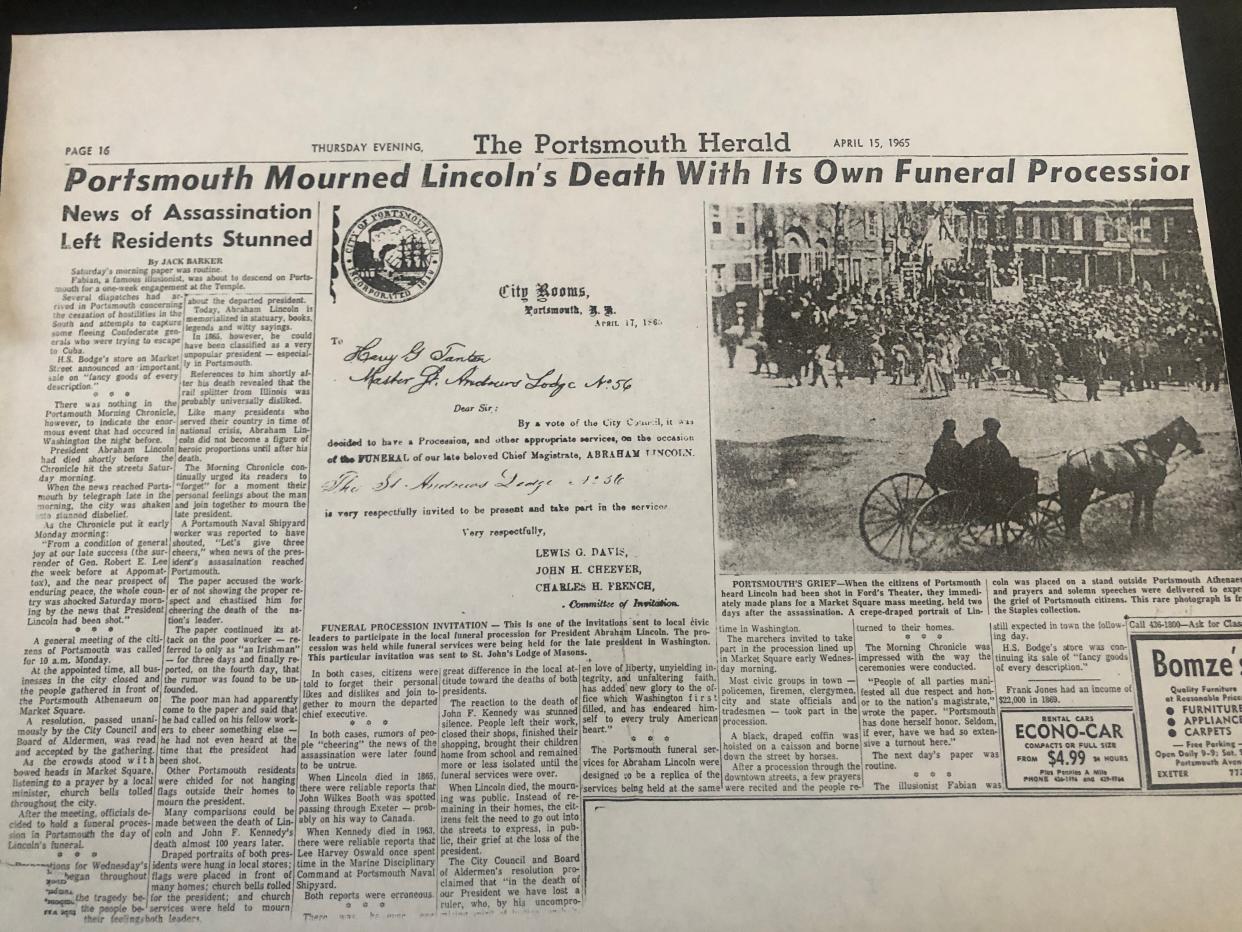
- Oops!Something went wrong.Please try again later.
- Oops!Something went wrong.Please try again later.
- Oops!Something went wrong.Please try again later.
The first U.S. president born west of the Appalachian Mountains came quietly into the world on Feb. 12, 1809, but Portsmouth and the rest of the world felt the shock of Abraham Lincoln's 1865 assassination.
The Civil War had ended five days before Lincoln was shot April 14 by Confederate sympathizer John Wilkes Booth at Ford Theatre in Washington, D.C. The president died early on the morning of April 15, and by that afternoon, a stunned nation began a prolonged period of mourning.
In Portsmouth, the city's bells tolled the rest of that day; flags were dropped to half-staff. The Portsmouth Navy Yard was shut down for five days.
On Monday, April 17, citizens gathered around a stand erected on Market Square in front of the Athenaeum.
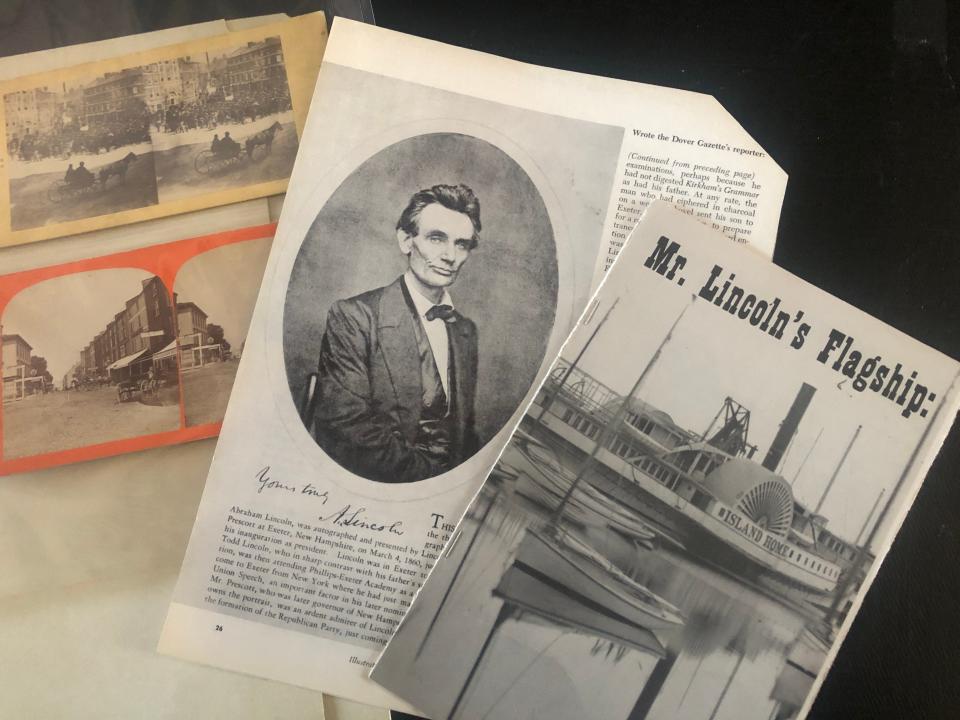
Newspaper accounts described it as "very tastefully draped with mourning emblems -- black and white festoons below, with a portrait of Mr. Lincoln, surmounted by a shield above, and the mottoes, 'The Lord gave and the Lord hath taken away,' and 'We mourn our beloved and honored Chief Magistrate, Abraham Lincoln.'"
Former New Hampshire Gov. Ichabod Goodwin presided over the event, which included prayers, speeches by the mayor and various ministers and officials, and solemn music by the Portsmouth Cornet Band. The service ended with the singing of two verses of "America," the Portsmouth Journal reported on its front page.
Photographer Carl Meinerth, who had a studio a block away, produced a stereoscopic image (a 19th-century version of Mattel's View-Master reels) of a large crowd of mourners.
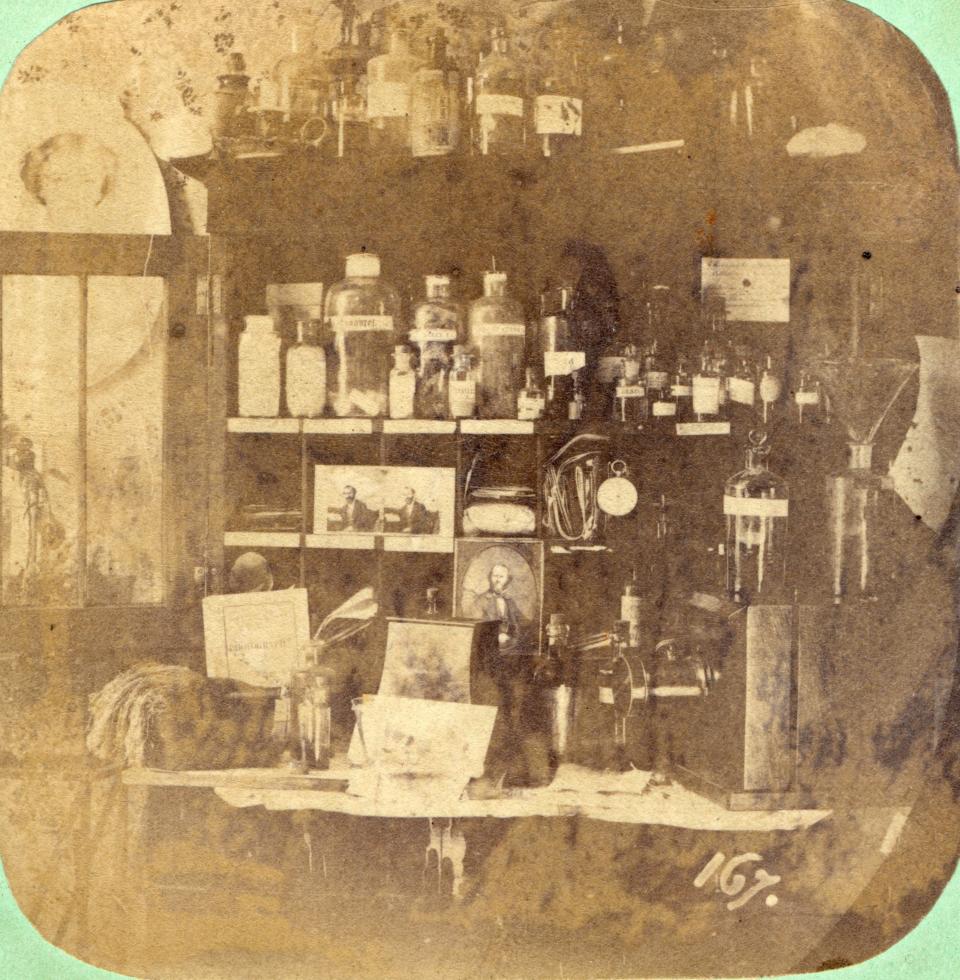
The Athenaeum's collections include this photo as well as a rare glimpse into Meinerth's Daniel Street studio, which was across the street from what is now the McIntyre Federal Building.
The 39-year-old German immigrant had come to the city some 15 years before Lincoln's death. The 1850 U.S. Census listed him as a music and drawing teacher in Portsmouth. By 1855 he had opened a photographic studio.
The Portsmouth Journal reported on Nov. 23, 1861 that "Mr. Meinerth has recently taken quite a large series of views, for the stereoscope, of the principal streets, public buildings, private residences, etc., and has been eminently successful."
In March 1863 he advertised in the Portsmouth Daily Chronicle that his Daniel Street studio hours were 11 a.m. to 3 p.m. every day except Thursday.
Sometime in 1865, Meinerth relocated to Newburyport, Mass., where he would work with one of his sons, applying for a patent in 1867 for his method of printing photos "having the effect of a mezzotint." He died in 1892, and is buried in Oak Hill Cemetery in Newburyport.
It's not known if Meinerth photographed the mock funeral for Lincoln held in Portsmouth on April 19, 1865. The funeral car "of a monumental order" created for the occasion is described in a pamphlet in the Athenaeum's archives titled "The Eulogy on Abraham Lincoln."
Its base was 14 1/2 feet long, with the body of the vehicle 11 feet long, 4 1/2 feet wide, and 6 feet high. The structure had a gambrel roof, and the entirety was covered in eight varieties of black fabric, including crape, velvet and lace.
Six heavy black-and-white plumes marked the center and sides of the roof and the word "Lincoln" was emblazoned in silver letters along the car's sides. A large gilt star decorated the back.
"Six black horses, ornamented with black plumes and rosettes, drew the car, and each horse had a groom dressed in mourning costume," the pamphlet reported.
The mock funeral took place the same day as Lincoln's funeral in Washington, D.C. The obsequies in the nation's Capitol were followed by services in Maryland, Pennsylvania, New York, Ohio, Indiana and Illinois. The 1,700-mile train journey would end May 4 with Lincoln's burial in his hometown of Springfield, Ill.
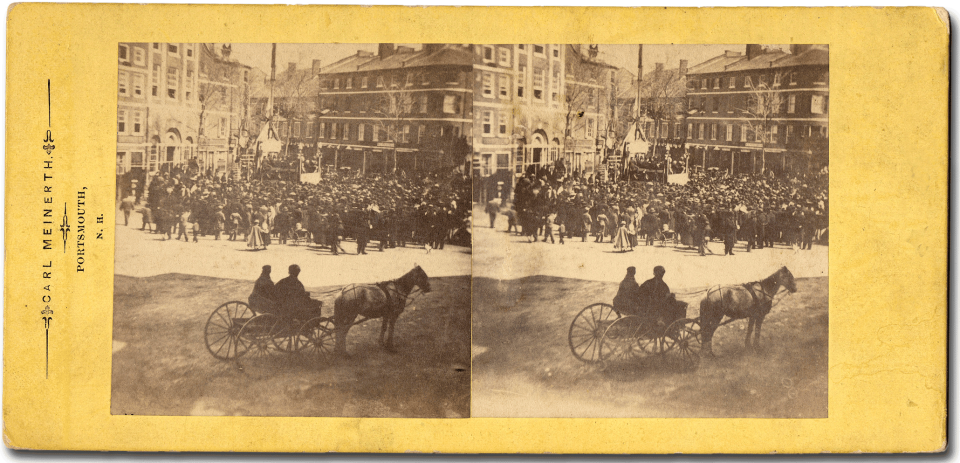
The Portsmouth service began and ended in Market Square with a half-mile-long procession looping through the city.
Between 1,200 and 1,400 marched, including members of the Army and Navy, Navy Yard officials, the Masons, Knights Templar, Odd Fellows, and Sons of Temperance. Also in the lineup were steam fire engines, the Band from Fort Constitution, and private citizens on foot and in carriages.
"An interesting feature of the procession was the car containing maimed sailors and soldiers," the pamphlet stated, listing the names and injuries of the 14 men.
About 3,000 had gathered to hear the eulogy by the Universalist minister Adoniram J. Patterson of Portsmouth's South Church.
Patterson told the familiar story of Lincoln's birth in a log cabin in Kentucky, his family's poverty and a thirst for knowledge that led him to study law, leading to his election to the state legislature in Illinois in 1834.
"Well may we mourn," Patterson told the crowd. "The death of Abraham Lincoln is a great calamity to this country."
Eight months before he was elected president, Lincoln visited New Hampshire in March 1860 to see his son Robert Todd Lincoln, a student at Phillips Exeter Academy. He was asked to speak in Dover, Concord and Manchester as well as Exeter.
Steve Wood of Claremont has reprised Lincoln's speech at Exeter Town Hall several times since beginning his work as a presenter of living history programs nearly three decades ago.
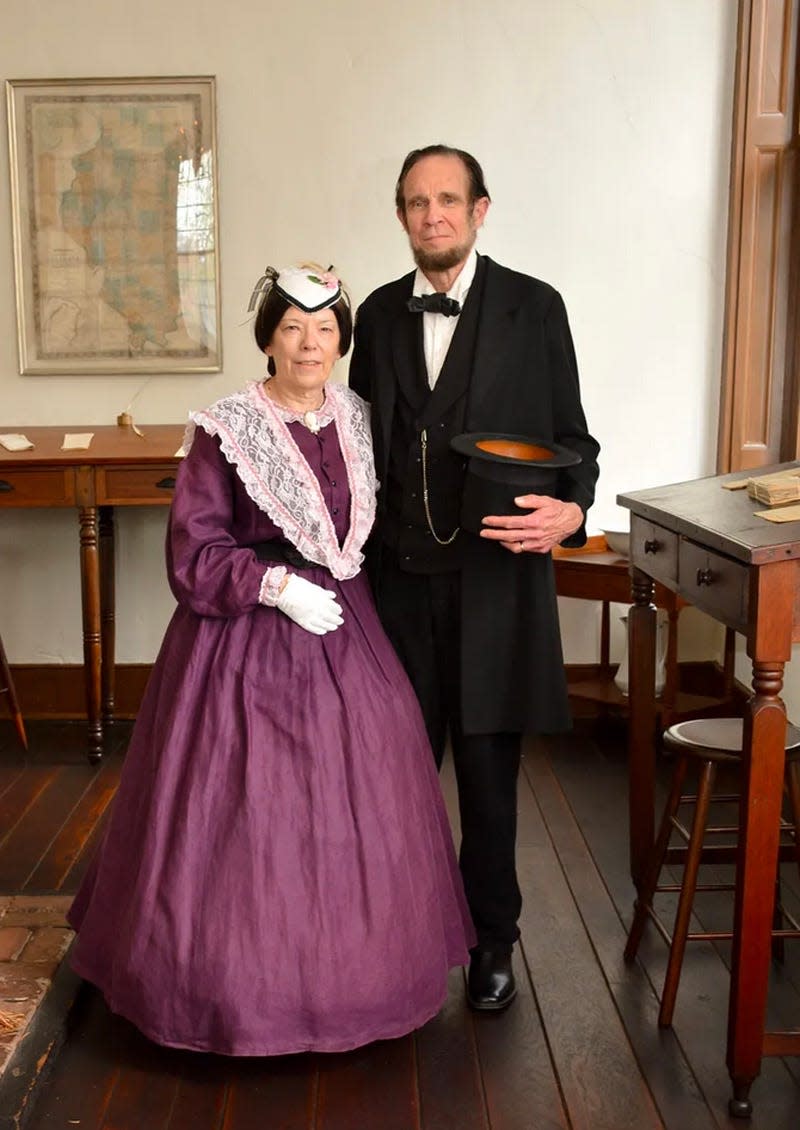
Wood's physical resemblance to Lincoln became more apparent when he shaved off his mustache (and kept his beard) to audition for a 1995 re-enactment in Claremont of Lincoln's 1860 debates with political rival Stephen Douglas.
Lincoln described himself as "6 foot 4, nearly" and Wood's height and stovepipe hat, along with years of telling the 16th president's story, make him a natural in his appearances at parades, re-enactments and before school groups. He's also focused on using Lincoln's words -- from the Gettysburg Address to newspaper accounts of his speeches to the letters he wrote during his career as a lawyer, state representative and Congressman.
"What's amazed me the most over time is just what an exceptional individual he turned out to be -- the right person at the right place at the right time," Wood said. "I can't think of anyone else who could have accomplished what he did."
That includes leading the country through four years of civil war (1861-1865) and issuing the Emancipation Proclamation on Jan. 1, 1863. Though it did not end slavery in the nation, it transformed the narrative around the war, infusing fresh energy into the Union cause.
It also "announced the acceptance of black men into the Union Army and Navy, enabling the liberated to become liberators," the National Archives states in its online description of the five-page document.
By the war's end, close to 200,000 black soldiers and sailors had joined the fight.
Wood said he is always struck by Lincoln's self-deprecating sense of humor.
"He was able to use humor to put people at ease and poke fun at himself," Wood said.
Lincoln's reputation as a frontiersman was encapsulated in his campaign nickname, "The Railsplitter."
Wood knows a few things about railsplitting -- he worked for nearly 30 years with the University of New Hampshire Cooperative Extension as an educator in forest resources. He retired in 2003.
He sometimes appears with his wife, Sharon Wood, who takes on the role of Mary Todd Lincoln.
Last month in New London, the historical actors presented their program "The Long and Short of It," which begins with Mary mourning her husband's death.
Lincoln then appears, visible only to the audience, and speaks to Mary. Their words are based on letters the couple wrote each other."We always get people saying, 'You made me cry,'" Sharon Wood said of the performance.
The former school and public librarian also makes appearances as New Hampshire-born writer and activist Sarah Josepha Hale. It was Hale who wrote to Lincoln in 1863 successfully urging him to issue a proclamation that set the precedent for a national Thanksgiving Day.
The Woods, who are in their 70s, are members of the Association of Lincoln Presenters as well as the New Hampshire Storytelling Alliance. They feel their work has had an impact on a generation of Granite Staters and would like to see the Lincoln tradition continue.
"We would welcome anyone interested in being mentored," Sharon Wood said.
The Portsmouth Athenaeum, 9 Market Square, is a membership library and museum founded in 1817. The research library and Randall Gallery are open Tuesday through Saturday, 1 to 4 p.m. Masks are required. For more information, call 603-431-2538 or visit www.portsmouthathenaeum.org.
This article originally appeared on Portsmouth Herald: When Portsmouth NH mourned President Abraham Lincoln

